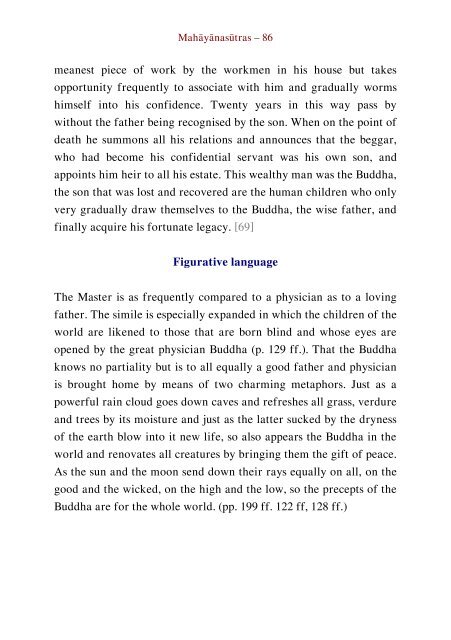Literary History of Sanskrit Buddhism
A study by J. K. Nariman of Sanskrit Buddhism from the Early Buddhist Tradition up to the Mahayana texts proper.
A study by J. K. Nariman of Sanskrit Buddhism from the Early Buddhist Tradition up to the Mahayana texts proper.
Create successful ePaper yourself
Turn your PDF publications into a flip-book with our unique Google optimized e-Paper software.
Mahāyānasūtras – 86<br />
meanest piece <strong>of</strong> work by the workmen in his house but takes<br />
opportunity frequently to associate with him and gradually worms<br />
himself into his confidence. Twenty years in this way pass by<br />
without the father being recognised by the son. When on the point <strong>of</strong><br />
death he summons all his relations and announces that the beggar,<br />
who had become his confidential servant was his own son, and<br />
appoints him heir to all his estate. This wealthy man was the Buddha,<br />
the son that was lost and recovered are the human children who only<br />
very gradually draw themselves to the Buddha, the wise father, and<br />
finally acquire his fortunate legacy. [69]<br />
Figurative language<br />
The Master is as frequently compared to a physician as to a loving<br />
father. The simile is especially expanded in which the children <strong>of</strong> the<br />
world are likened to those that are born blind and whose eyes are<br />
opened by the great physician Buddha (p. 129 ff.). That the Buddha<br />
knows no partiality but is to all equally a good father and physician<br />
is brought home by means <strong>of</strong> two charming metaphors. Just as a<br />
powerful rain cloud goes down caves and refreshes all grass, verdure<br />
and trees by its moisture and just as the latter sucked by the dryness<br />
<strong>of</strong> the earth blow into it new life, so also appears the Buddha in the<br />
world and renovates all creatures by bringing them the gift <strong>of</strong> peace.<br />
As the sun and the moon send down their rays equally on all, on the<br />
good and the wicked, on the high and the low, so the precepts <strong>of</strong> the<br />
Buddha are for the whole world. (pp. 199 ff. 122 ff, 128 ff.)


















